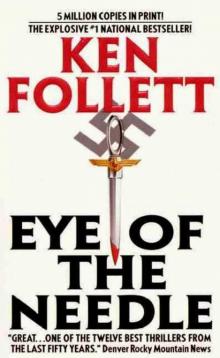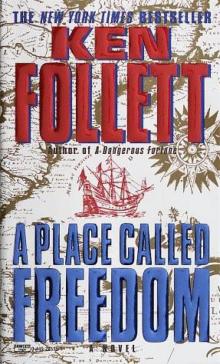- Home
- Ken Follett
On Wings of Eagles Page 4
On Wings of Eagles Read online
Page 4
They drove down the tree-lined Eisenhower Avenue, as wide and straight as any American highway, and pulled into the courtyard of a square, ten-story building set back from the street and guarded by soldiers with automatic rifles. This was the Social Security Organization of the Ministry of Health and Social Welfare. It was to have been the powerhouse of the new Iranian welfare state: here, side by side, the Iranian government and EDS had worked to build a social-security system. EDS occupied the entire seventh floor--Bill's office was there.
Paul, Bill, and Abolhasan showed their passes and went in. The corridors were dirty and poorly decorated, and the building was cold: the heat was off again. They were directed to the office Mr. Dadgar was using.
They found him in a small room with dirty walls, sitting behind an old gray steel desk. In front of him on the desk were a notebook and a pen. Through the window Paul could see the data center EDS was building next door.
Abolhasan introduced everyone. There was an Iranian woman sitting on a chair beside Dadgar's desk: her name was Mrs. Nourbash, and she was Dadgar's interpreter.
They all sat down on dilapidated metal chairs. Tea was served. Dadgar began to speak in Farsi. His voice was soft but rather deep, and his expression was blank. Paul studied him as he waited for the translation. Dadgar was a short, stocky man in his fifties, and for some reason he made Paul think of Archie Bunker. His complexion was dark and his hair was combed forward, as if to hide the fact that it was receding. He had a mustache and glasses, and he wore a sober suit.
Dadgar finished speaking, and Abolhasan said: "He warns you that he has the power to arrest you if he finds your answers to his questions unsatisfactory. In case you did not realize this, he says you may postpone the interview to give your lawyers time to arrange bail."
Paul was surprised by this development, but he evaluated it fast, just like any other business decision. Okay, he thought, the worst thing that can happen is that he won't believe us and he will arrest us--but we're not murderers, we'll be out on bail in twenty-four hours. Then we might be confined to the country, and we would have to meet with our attorneys and try to work things out ... which is no worse than the situation we're in now.
He looked at Bill. "What do you think?"
Bill shrugged. "Goelz says this meeting is routine. The stuff about bail sounds like a formality--like reading you your rights."
Paul nodded. "And the last thing we want is a postponement."
"Then let's get it over with."
Paul turned to Mrs. Nourbash. "Please tell Mr. Dadgar that neither of us has committed a crime, and neither of us has any knowledge of anyone else committing a crime, so we are confident that no charges will be made against us, and we would like to get this finished up today so that we can go home."
Mrs. Nourbash translated.
Dadgar said he wanted first to interview Paul alone. Bill should come back in an hour.
Bill left.
Bill went up to his office on the seventh floor. He picked up the phone, called Bucharest, and reached Lloyd Briggs. Briggs was Number 3 in the hierarchy after Paul and Bill.
"Dadgar says he has the power to arrest us," Bill told Briggs. "We might need to put up bail. Call the Iranian attorneys and find out what that means."
"Sure," Briggs said. "Where are you?"
"In my office here at the Ministry."
"I'll get back to you."
Bill hung up and waited. The idea of his being arrested was kind of ridiculous--despite the widespread corruption of modem Iran, EDS had never paid bribes to get contracts. But even if bribes had been paid, Bill would not have paid them: his job was to deliver the product, not win the order.
Briggs called back within a few minutes. "You've got nothing to worry about," he said. "Just last week a man accused of murder had his bail set at a million and a half rials."
Bill did a quick calculation: That was twenty thousand dollars. EDS could probably pay that in cash. For some weeks they had been keeping large amounts of cash, both because of the bank strikes and for use during the evacuation. "How much do we have in the office safe?"
"Around seven million rials, plus fifty thousand dollars."
So, Bill thought, even if we are arrested, we'll be able to post bail immediately. "Thanks," he said. "That makes me feel a lot better."
Downstairs, Dadgar had written down Paul's full name, date and place of birth, schools attended, experience in computers, and qualifications; and he had carefully examined the document that officially named Paul as Country Manager for Electronic Data Systems Corporation Iran. Now he asked Paul to give an account of how EDS had secured its contract with the Ministry of Health.
Paul took a deep breath. "First, I would like to point out that I was not working in Iran at the time the contract was negotiated and signed, so I do not have firsthand knowledge of this. However, I will tell you what I understand the procedure to have been."
Mrs. Nourbash translated and Dadgar nodded.
Paul continued, speaking slowly and rather formally to help the translator. "In 1975 an EDS executive, Paul Bucha, learned that the Ministry was looking for a data-processing company experienced in health insurance and social-security work. He came to Tehran, had meetings with Ministry officials, and determined the nature and scale of the work the Ministry wanted done. He was told that the Ministry had already received proposals for the project from Louis Berger and Company, Marsh & McClennan, ISIRAN, and UNI-VAC, and that a fifth proposal was on its way from Cap Gemini Sogeti. He said that EDS was the leading data-processing company in the United States and that our company specialized in exactly this kind of health-care work. He offered the Ministry a free preliminary study. The offer was accepted."
When he paused for translation, Paul noticed, Mrs. Nourbash seemed to say less than he had said; and what Dadgar wrote down was shorter still. He began to speak more slowly and to pause more often. "The Ministry obviously liked EDS's proposals, because they then asked us to perform a detailed study for two hundred thousand dollars. The results of our study were presented in October 1975. The Ministry accepted our proposal and began contract negotiations. By August 1976 the contract was agreed upon."
"Was everything aboveboard?" Dadgar asked through Mrs. Nourbash.
"Absolutely," Paul said. "It took another three months to go through the lengthy process of getting all the necessary approvals from many government departments, including the Shah's court. None of these steps was omitted. The contract went into effect at the end of the year."
"Was the contract price exorbitant?"
"It showed a maximum expected pretax profit of twenty percent, which is in line with other contracts of this magnitude, both here and in other countries."
"And has EDS fulfilled its obligations under the contract?"
This was something on which Paul did have firsthand knowledge. "Yes, we have."
"Could you produce evidence?"
"Certainly. The contract specifies that I should meet with Ministry officials at certain intervals to review progress: those meetings have taken place and the Ministry has the minutes of the meetings on file. The contract lays down a complaints procedure for the Ministry to use if EDS fails to fulfill its obligations: that procedure has never been used."
Mrs. Nourbash translated, but Dadgar did not write anything down. He must know all this anyway, Paul thought.
He added: "Look out the window. There is our data center. Go and see it. There are computers in it. Touch them. They work. They produce information. Read the printouts. They are being used."
Dadgar made a brief note. Paul wondered what he was really after.
The next question was: "What is your relationship with the Mahvi group?"
"When we first came to Iran we were told that we had to have Iranian partners in order to do business here. The Mahvi group are our partners. However, their main role is to supply us with Iranian staff. We meet with them periodically, but they have little to do with the running of our business."
>
Dadgar asked why Dr. Towliati, a Ministry official, was on the EDS payroll. Was this not a conflict of interest?
Here at last was a question that made sense. Paul could see how Towliati's role could appear irregular. However, it was easily explained. "In our contract we undertake to supply expert consultants to help the Ministry make the best use of the service we provide. Dr. Towliati is such a consultant. He has a data-processing background, and he is familiar with both Iranian and American business methods. He is paid by EDS, rather than by the Ministry, because Ministry salaries are too low to attract a man of his caliber. However, the Ministry is obliged to reimburse us for his salary, as laid down in the contract; so he is not really paid by us."
Once again Dadgar wrote down very little. He could have got all this information from the files, Paul thought; perhaps he has.
Dadgar asked: "But why does Dr. Towliati sign invoices?"
"That's easy," Paul replied. "He does not, and never has. The closest he comes is this: he would inform the Minister that a certain task has been completed, where the specification of that task is too technical for verification by a layman." Paul smiled. "He takes his responsibility to the Ministry very seriously--he is easily our harshest critic, and he will characteristically ask a lot of tough questions before verifying completion of a task. I sometimes wish I did have him in my pocket."
Mrs. Nourbash translated. Paul was thinking: What is Dadgar after? First he asks about the contract negotiations, which happened before my time; then about the Mahvi group and Dr. Towliati, as if they were sensationally important. Maybe Dadgar himself doesn't know what he's looking for--maybe he's just fishing, hoping to come up with evidence of something illegal.
How long can this farce go on?
Bill was outside in the corridor, wearing his topcoat to keep out the cold. Someone had brought him a glass of tea, and he warmed his hands on it while he sipped. The building was dark as well as cold.
Dadgar had immediately struck Bill as being different from the average Iranian. He was cold, gruff, and inhospitable. The Embassy had said Dadgar was "favorably disposed" toward Bill and Paul, but that was not the impression Bill had.
Bill wondered what game Dadgar was playing. Was he trying to intimidate them, or was he seriously considering arresting them? Either way, the meeting was not turning out the way the Embassy had anticipated. Their advice, to come without lawyers or Embassy representatives, now looked mistaken: perhaps they just did not want to get involved. Anyway, Paul and Bill were on their own now. It was not going to be a pleasant day. But at the end of it they would be able to go home.
Looking out the window, Bill saw that there was some excitement down on Eisenhower Avenue. Some distance along the street, dissidents were stopping cars and putting Khomeini posters on the windshields. The soldiers guarding the Ministry Building were stopping the cars and tearing the posters up. As he watched, the soldiers became more belligerent. They broke the headlight of a car, then the windshield of another, as if to teach the drivers a lesson. Next they pulled a driver out of a car and punched him around.
The next car they picked on was a taxi, a Tehran orange cab. It went by without stopping, not surprisingly; but the soldiers seemed angered and chased it, firing their guns. Cab and pursuing soldiers disappeared from Bill's sight.
After that the soldiers ended their grim game and returned to their posts inside the walled courtyard in front of the Ministry Building. The incident, with its queer mixture of childishness and brutality, seemed to sum up what was going on in Iran. The country was going down the drain. The Shah had lost control and the rebels were determined to drive him out or kill him. Bill felt sorry for the people in the cars, victims of circumstance who could do nothing but hope that things would get better. If Iranians are no longer safe, he thought, Americans must be in even more danger. We've got to get out of this country.
Two Iranians were hanging about in the same corridor, watching the fracas on Eisenhower Avenue. They seemed as appalled as Bill at what they saw.
Morning turned into afternoon. Bill got more tea and a sandwich for lunch. He wondered what was happening in the interrogation room. He was not surprised to be kept waiting: in Iran "an hour" meant nothing more precise than "later, maybe." But as the day wore on he became more uneasy. Was Paul in trouble in there?
The two Iranians stayed in the corridor all afternoon, doing nothing. Bill wondered vaguely who they were. He did not speak to them.
He wished the time would pass more quickly. He had a reservation on tomorrow's plane. Emily and the kids were in Washington, where both Emily's and Bill's parents lived. They had a big party planned for him on New Year's Eve. He could hardly wait to see them all again.
He should have left Iran weeks ago, when the firebombing started. One of the people whose homes had been bombed was a girl with whom he had gone to high school in Washington. She was married to a diplomat at the U.S. Embassy. Bill had talked to them about the incident. Nobody had been hurt, luckily, but it had been very scary. I should have taken heed, and got out then, he thought.
At last Abolhasan opened the door and called: "Bill! Come in, please."
Bill looked at his watch. It was five o'clock. He went in.
"It's cold," he said as he sat down.
"It's warm enough in this seat," Paul said with a strained smile. Bill looked at Paul's face: he seemed very uncomfortable.
Dadgar drank a glass of tea and ate a sandwich before he began to question Bill. Watching him, Bill thought: look out--this guy is trying to trap us so he won't have to let us leave the country.
The interview started. Bill gave his full name, date and place of birth, schools attended, qualifications, and experience. Dadgar's face was blank as he asked the questions and wrote down the answers: he was like a machine, Bill thought.
He began to see why the interview with Paul had taken so long. Each question had to be translated from Farsi into English and each answer from English into Farsi. Mrs. Nourbash did the translation, Abolhasan interrupting with clarification and corrections.
Dadgar questioned Bill about EDS's performance of the Ministry contract. Bill answered at length and in detail, although the subject was both complicated and highly technical, and he was pretty sure that Mrs. Nourbash could not really understand what he was saying. Anyway, no one could hope to grasp the complexities of the entire project by asking a handful of general questions. What kind of foolishness was this? Bill wondered. Why did Dadgar want to sit all day in a freezing cold room and ask stupid questions? It was some kind of Persian ritual, Bill decided. Dadgar needed to pad out his records, show that he had explored every avenue, and protect himself in advance against possible criticism for letting them go. At the absolute worst, he might detain them in Iran a while longer. Either way, it was just a matter of time.
Both Dadgar and Mrs. Nourbash seemed hostile. The interview became more like a courtroom cross-examination. Dadgar said that EDS's progress reports to the Ministry had been false, and EDS had used them to make the Ministry pay for work that had not been done. Bill pointed out that Ministry officials, who were in a position to know, had never suggested that the reports were inaccurate. If EDS had fallen down on the job, where were the complaints? Dadgar could examine the Ministry's files.
Dadgar asked about Dr. Towliati, and when Bill explained Towliati's role, Mrs. Nourbash--speaking before Dadgar had given her anything to translate--replied that Bill's explanation was untrue.
There were several miscellaneous questions, including a completely mystifying one: did EDS have any Greek employees? Bill said they did not, wondering what that had to do with anything. Dadgar seemed impatient. Perhaps he had hoped that Bill's answers would contradict Paul's; and now, disappointed, he was just going through the motions. His questioning became perfunctory and hurried; he did not follow up Bill's answers with further questions or requests for clarification; and he wound up the interview after an hour.
Mrs. Nourbash said: "You will now
please sign your names against each of the questions and answers in Mr. Dadgar's notebook."
"But they're in Farsi--we can't read a word of it!" Bill protested. It's a trick, he thought; we'll be signing a confession to murder or espionage or some other crime Dadgar has invented.
Abolhasan said: "I will look over his notes and check them."
Paul and Bill waited while Abolhasan read through the notebook. It seemed a very cursory check. He put the book down on the desk. "I advise you to sign."
Bill was sure he should not--but he had no choice. If he wanted to go home, he had to sign.
He looked at Paul. Paul shrugged. "I guess we'd better do it."
They went through the notebook in turn, writing their names beside the incomprehensible squiggles of Farsi.
When they finished, the atmosphere in the room was tense. Now, Bill thought, he has to tell us we can go home.
Dadgar shuffled his papers into a neat stack while he talked to Abolhasan in Farsi for several minutes. Then he left the room. Abolhasan turned to Paul and Bill, his face grave.
"You are being arrested," he said.
Bill's heart sank. No plane, no Washington, no Emily, no New Year's Eve party ...
"Bail has been set at ninety million tomans, sixty for Paul and thirty for Bill."
"Jesus!" Paul said. "Ninety million tomans is ..."
Abolhasan worked it out on a scrap of paper. "A little under thirteen million dollars."
"You're kidding!" Bill said. "Thirteen million? A murderer's bail is twenty thousand."
Abolhasan said: "He asks whether you are ready to post the bail."
Paul laughed. "Tell him I'm a little short now. I'm going to have to go to the bank."
Abolhasan said nothing.
"He can't be serious," Paul said.
"He's serious," said Abolhasan.
Suddenly Bill was mad as hell--mad at Dadgar, mad at Lou Goelz, mad at the whole damn world. It had been a sucker trap and they had fallen right into it. Why, they had walked in here of their own free will, to keep an appointment made by the U.S. Embassy. They had done nothing wrong and nobody had a shred of evidence against them--yet they were going to jail, and worse, an Iranian jail!

 The Pillars of the Earth
The Pillars of the Earth Eye Of The Needle
Eye Of The Needle Lie Down With Lions
Lie Down With Lions Winter of the World
Winter of the World Triple
Triple World Without End
World Without End Fall of Giants
Fall of Giants Jackdaws
Jackdaws Hornet Flight
Hornet Flight Whiteout
Whiteout A Dangerous Fortune
A Dangerous Fortune The Man From St. Petersburg
The Man From St. Petersburg A Column of Fire
A Column of Fire The Hammer of Eden
The Hammer of Eden On Wings of Eagles
On Wings of Eagles The Evening and the Morning
The Evening and the Morning The Key to Rebecca
The Key to Rebecca Code to Zero
Code to Zero Paper Money
Paper Money A Place Called Freedom
A Place Called Freedom The Modigliani Scandal
The Modigliani Scandal Triple (1991)
Triple (1991) A Dangerous Fortune (1994)
A Dangerous Fortune (1994) A Place Called Freedom (1995)
A Place Called Freedom (1995) Winter of the World (Century Trilogy 2)
Winter of the World (Century Trilogy 2) Code to Zero (2000)
Code to Zero (2000) On Wings Of Eagles (1990)
On Wings Of Eagles (1990) Storm Island
Storm Island Fall of Giants (The Century Trilogy)
Fall of Giants (The Century Trilogy) the Third Twin (1996)
the Third Twin (1996) The Modigliani Scandal (1976)
The Modigliani Scandal (1976) Night Over Water
Night Over Water